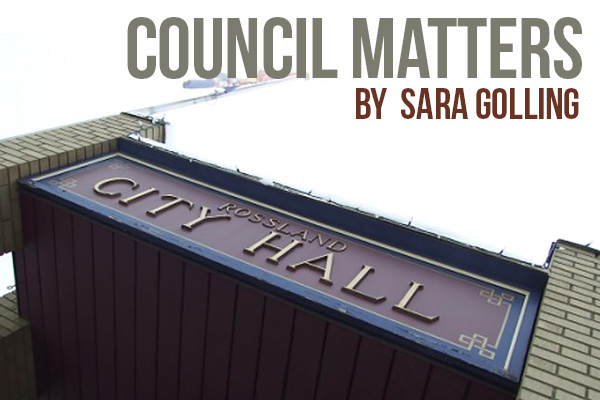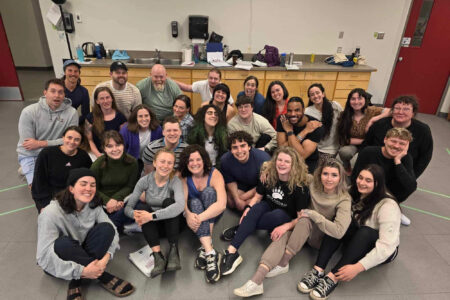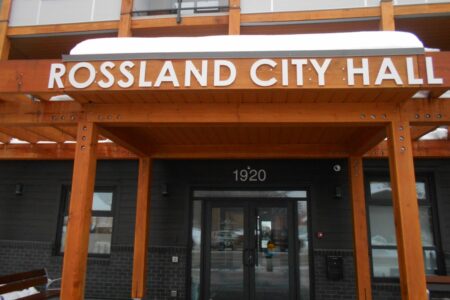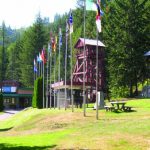Taxes, Wetland studies, a rising young hockey star, Spokane Street Project news
Two meetings to report here: May 4 and May 8. Read on!
Rossland City Council held a Public Hearing on the new Financial Plan and the new municipal property tax rates on Thursday, May 4. Council was present, and Financial Manager Elma Hamming explained the changes and answered questions from the four interested citizens who showed up. The key points from this meeting were:
Municipal tax rates will be rising, to address our infrastructure deficit as well as rising operating expenses — labour expenses rise as do the costs of materials, supplies, energy, and so on. Staff are constantly seeking ways to minimize the cost of City operations to taxpayers.
Municipal property taxes are set to rise by 4.75% for 2017. To translate that into dollars, Hamming said that for the “average” Rossland home assessed at $260,000, taxes will rise by about $190. Council had made new and different efforts to get input from citizens before setting the tax rates, and more citizens had responded than ever before.
Water and sewer rates will also increase, but will still not cover the costs of operating the services as Council acknowledges they should. Council wants to achieve that goal by gradual increments.
On Monday, May 8, Council held a brisk and efficient regular council meeting. Present were Mayor Kathy Moore, and Councillors Lloyd McLellan, John Greene, Marten Kruysse, Andy Morel, and Andrew Zwicker. Only Aaron Cosbey was absent.
Public Input Period: A resident and his 11-year-old son, a rising PeeWee hockey star who has already been headhunted by the Vancouver Warriors for his skill, sought Council’s permission to arrange for use of the arena when possible from now until August for shooting practice (using in-line skates), to retain his proficiency over the summer. He will be travelling to Helsinki in August with the Vancouver Warriors, and is training with a Smoke Eaters mentor and Rossland resident, Ross Armour. Moore responded that Council will discuss his request with staff and get back to him.
Delegation: Rossland Summit School (RSS) teacher Laura Jackman and three of her students from Grade Two presented a request to the City for permission to place a shed near the Jubilee Wetland, to store educational materials for studying the wetland and its denizens. She is raising the funding and has arranged for the shed to be built by the Stanley Humphries woodworking class, then re-assembled on site. She envisions the shed having a combination lock, and being accessible to others in the community who can benefit from the educational tools it will hold — not just RSS.
Her students addressed Council in turn with this request, which they had composed themselves:
“Can we please paint yellow fish onto the storm drains uphill from Jubilee Wetland?”
“We have been studying the wetland since the beginning of the year.”
“We want to paint the fish on the drains so that people will be careful about what goes down them.”
“We have the power to protect our wetland. What goes in our wetland affects Trail Creek, the Columbia River, and the ocean.”
Council was impressed by the presentation and had received the materials in advance. Though the normal practice is to make decisions on such requests at the following Council meeting, Council was aware that little of the school year remains; they had been able to do the necessary checking in advance of this meeting were able to pass the motions permitting the storm drain marking and the placement of the shed.
Support for the Family Action Network (FAN):
Council members noted the importance of early childhood development and the value of FAN’s work with children and parents; a motion to support FAN with a $500 donation for this year CARRIED. Moore noted that FAN should apply through the Community Grants for next year.
Development Variance Permit:
An application for a variance to allow a concrete lock-block retaining wall at 2063A Columbia Avenue (the lane to the north of Columbia) CARRIED. The aesthetic impact on the neighbourhood is negligible, Council members noted.
Bylaws:
A Zoning Amendment bylaw for 2253 Washington Street, changing the zoning from R3 — Residential Multiple Family to C3 — Commercial Resort Accommodation was ADOPTED with no opposing votes.
Council then ADOPTED both the Financial Plan Bylaw 2017 — 2021 and the 2017 Municipal Tax Rate Bylaw, again with no opposing votes.
Reviewing information:
During discussion of the various staff reports and updates, Moore expressed agreement with the staff recommendation to include the proposal for Pickleball courts at the Emcon site in further public consultations.
Council then approved all recommendations in the list of “Information Items.” Chief Administrative Office Bryan Teasdale commented that the Golden City Days requests would have to be adjusted — some activities re-located — because of the Spokane Street Project work. Council passed a motion requesting staff to investigate the cost of hiring a contractor to review the Design Review Panel guidelines. Council members were pleased that the Huck-En Berries Bike Jam is being planned to avoid any impacts on the Centennial Wetland.
Members Reports: Council members reported on meetings and other activities; McLellan commented that visitors to town for the Association of Kootenay-Boundary Local Governments conference were favourably impressed by the Jubilee Wetland restoration. Greene reported that around 100 people will be coming to the area for the Metal Tech Alley opening event on May 24, and Moore noted that the purpose of the tour (which Greene will be leading) is to show potential investors what the area has to offer.
The Spokane Street Project is slated to begin on May 15; be prepared for noise, dust, and having to take alternate routes to get places! To see the City’s full notice and map, click the link.
The meeting adjourned and your reporter strolled home in the lovely evening, walking down the LeRoi hill from Spokane to Davis en route and wondering how it will look with sidewalks ― hoping there will be sidewalks; it’s a route used by many pedestrians and school children. And pondering how much better many drivers would feel if they became pedestrians instead, walking up and down our hills more often without the assistance of fossil-fuel-propelled tons of metal, electronics and upholstery to carry one lone body a few blocks; and how the word “pedestrian” has that unfortunate and unfair secondary meaning of “ordinary” when pedestrians are no longer as ordinary ― as numerous ― as we used to be, and how the word “walker” has come to name a device that those who have difficulty walking can lean on for assistance, instead of meaning “one who walks.”
























